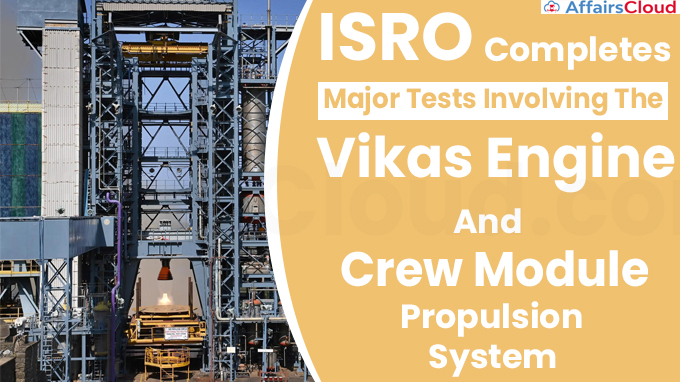 The Indian Space Research Organisation (ISRO) has successfully completed two significant tests for Gaganyaan—the Human Space Flight Programme—at the ISRO Propulsion Complex (IPRC) in Mahendragiri, Tirunelveli District, Tamil Nadu. The two key tests are as follows:
The Indian Space Research Organisation (ISRO) has successfully completed two significant tests for Gaganyaan—the Human Space Flight Programme—at the ISRO Propulsion Complex (IPRC) in Mahendragiri, Tirunelveli District, Tamil Nadu. The two key tests are as follows:
- Human-Rated Vikas Engine Test Campaign for the L110 Stage
- SDM (System Demonstration Model) tests for the Crew Module Propulsion System
The successful completion of these two tests signifies a major accomplishment in ISRO’s Gaganyaan mission.
Human Rated Vikas Engine Test Campaign for The L110 Stage
On April 6, 2023, the final long-duration hot test of the Human-Rated L110-G Vikas Engine for the planned qualifying duration of 240 seconds was successfully accomplished at the IPRC, Mahendragiri.
- With the completion of this test, the engine successfully completed every intended qualifying test.
Human-Rated L110-G Vikas Engine
i.The air-lit liquid core stage of the human-rated launch vehicle (LVM3-G) is powered by two clustered L110-G Vikas engines.
ii.The Liquid Propulsion Systems Centre (LPSC) created and developed the L110 stage for Gaganyaan, while the IPRC handled its assembly, integration, and testing.
iii.The Engine Gimbal Control system was developed by the Vikram Sarabhai Space Centre (VSSC) in Thiruvananthapuram, Kerala.
Key Points:
i.The Vikas engine operates on a pump-fed gas generator cycle using storable propellants.
ii.The human-rated Vikas engine includes improved structural margins for subsystems, an enhanced assembly process, and additional health monitoring metrics.
iii.Step-by-step human-rated Vikas engine development heat tests were carried out at the Principal Test Stand, IPRC.
- Nine engines had been subjected to 14 hot tests with a cumulative duration of 1215 seconds, including four long-duration tests lasting 240 seconds each.
iv.The test campaign encompasses extreme operating durations, off-nominal mixture ratios, and thrust level situations as contrasted to flight operating conditions, relying on the extensive legacy and expertise of liquid rocket engine development.
v.For this test program, four sets of hardware were developed in various Indian industries.
vi.The test also qualified electro-mechanical Gimbal actuators and a Command System module for engine pilot pressure control with multiple redundancies.
vii.According to ISRO, the human-rated L110-G Vikas engine qualification could potentially be completed in three years.
SDM Tests for Crew Module Propulsion System for The Gaganyaan Programme
On April 5, 2023, the hot test of the Crew Module Propulsion System for demonstrating nominal re-entry for 650 seconds was successfully completed at the IPRC, Mahendragiri.
- This system was designed, developed, and realized by Liquid Propulsion Systems Centre (LPSC), located in Valiamala, Kerala.
- This test is an important step towards qualifying the Crew Module Propulsion System for the Gaganyaan Program.
Prior to this, a series of tests with six thrusters were conducted.
Key Points:
i.The crew module features a bipropellant-based propulsion system that provides 3-axis control (Pitch, Yaw, and Roll) to the crew module following service module separation during re-entry—that is, from an altitude of 170km to 7km till the deployment of the parachute-based deceleration system.
ii.In the event of an ascent phase abort, it also offers attitude control between 3 and 70 kilometres.
iii.The hardware of the crew module propulsion system consists of 12 100-N thrusters and associated flow control components.
Recent Related News:
Indian Institute of Technology Madras (IIT Madras) and the Indian Space Research Organization (ISRO) signed a Memorandum of Understanding (MoU) to collaborate on the application of Extended Reality (XR) and other technologies in the Indian Human Spaceflight Programme (IHSP).
About the Indian Space Research Organisation (ISRO):
Chairman – S. Somanath
Headquarters – Bengaluru, Karnataka
Establishment – 1969




